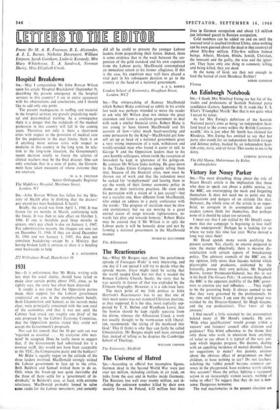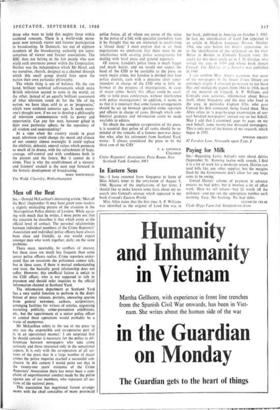Victory for Nosey Parker SIR,—The most disturbing thing about the
title of Stuart Hood's article is the implication that those who dare to speak out about a public service, i.e. the BBC, are overstepping the mark and forgetting themselves. It does not need me to point out the implications and dangers of an attitude like that. However, the whole tone of the article is so super- ficial, so arrogant in its assumption that your readers cannot think for themselves, that perhaps none of it should be taken too seriously.
I 'must say that I am tickled by Mr Hood's state- ment that our campaign 'is beginning to lose itself in the undergrowth.' Perhaps he is looking for us where we were this time last year. We've moved a long way since then!
Mr Hood spends many words justifying the present system. Yet, clearly, to anyone prepared to view the matter objectively, there is massive dis- satisfaction with certain aspects of broadcasting policy. The advisory councils of the BBC are, in my opinion, little more than facades behind which playwrights and producers, cushioned by the hierarchy, pursue their own policies. Mr Reginald Bevins, former Postmaster-General, has this to say in his book The Greasy Pole: 'A curious thing about the BBC is the apparent inability of the BBC gover- nors to exercise any real influence. . . . They ought to be the governing body. It always seemed to me that they were governed by the professionals. In my time and before, I am sure the real power was wielded by the Director-General, Sir Hugh Greene, and the top professionals. They knew all the answers.'
I find myself a little sickened by the presumption behind many of Mr Hood's remarks. He asks 'With what qualifications' would groups within a viewers' and listeners' council offer criticism and guidance? This blind adherence to the theme that only those who work in television have anything of value to say about it is typical of the very atti- tude which impedes progress. Do doctors, dealing with an appalling incidence of mental disorder, have no suggestions to make? Are parents, anxious about the obvious effect of programmes on their children, to have nothing to say? Do not teachers, witching the 'rabbit punch' become common cur- rency in the playground, have evidence worth taking into account? Have the police, fighting a rearguard action in an increasingly violent society, nothing of value to offer? To suggest that they do not is non- sense. Dangerous nonsense.
The real reactionaries in the present situation are
those who want to hold this mighty force within outdated concepts. There is a world-wide move- ment now towards viewer and listener participation in broadcasting. In Denmark, ten out of eighteen members of the broadcasting authority are repre- sentatives of viewer and listener associations. The BBC does not belong to the few people who now wield such enormous power within the Corporation. Neither was the independence which Mr Hood, and we ourselves, cherish, designed as a channel through which this small group should foist upon the nation their own particular philosophy.
The whole thing is out of balance. On the one hand, brilliant technical achievements which make British television second to none in the world; on the other, instead of an equally brilliant assessment of what television could do for the life of the nation, we have ideas sold to us as 'progressive,' which were outdated centuries ago. It needs every- one's thought now, if we are to develop a philosophy of television commensurate with its power and opportunity. Can any few men, however gifted in their own particular sphere, be the repository of all wisdom and understanding?
At a time when the country stands in great need, television could change the mood and climate of our country almost overnight. It could replace the nihilistic, defeatist, amoral values which permeate so much of its drama, with the refreshment of hope, courage, self-control and with confidence both in the present and the future." But it cannot do it alone. That is why the establishment of a viewers' and listeners' council is the next step forward in the historic development of broadcasting.



































 Previous page
Previous page